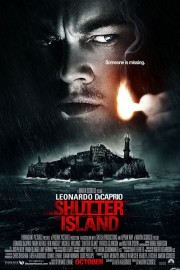Shutter Island
Like Quentin Tarantino, cinema is in the DNA of every Martin Scorsese film. That has been never more evident in recent years than in his superb documentaries on American and Italian films, which are a combined 8 hours of going into the psyche of a man who holds a doctorate in cinema. In his feature films, that influence has been hidden in plain sight…until now.
“Shutter Island” is based on the novel by Dennis Lahane (whose books also became the memorable films “Mystic River” and “Gone Baby Gone”), but Scorsese has adapted it with screenwriter Laeta Kalogridis into his purest distillation of the films and filmmakers he loves, from Hitchcock (“Vertigo”) to Kubrick (“The Shining”) to the little-known, but completely gripping, Samuel Fuller drama “Shock Corridor,” in which a reporter has himself committed to a mental institution to study the conditions of the hospital, only to go insane himself.
That last one is the key for “Shutter Island,” in which Federal Marshal Teddy Daniels (Leonardo DiCaprio, in his fourth and finest performance to date for Marty) and his partner Chuck Aule (Mark Ruffalo) go to the remote island hospital of Ashecliffe Hospital for the Criminally Insane. The year is 1954, when Cold War paranoia and secret government lead to a lot of psychological testing and experiments with mind control. A patient named Rachel Solando has supposedly escaped- she killed her three children. But how is it possible on an island where every inch is covered with security, the walls of the former Civil War fort are electrified, and nobody could possibly escape their room without someone noticing? Teddy doesn’t feel like he’s getting the truth, not from Dr. Cawley (a creepy, startling Sir Ben Kingsley), not from the mysterious Dr. Naehring (the great Max Von Sydow), and certainly not from the warden (Ted Levine) and deputy warden (John Carroll Lynch). A note found in Rachel’s room- “Who is 67?”- and a prisoner by the name of Andrew Laeddis might hold the key.
Scorsese is returning to a true genre film for the first time since his 1991 remake of “Cape Fear.” But he’s too good of a filmmaker to just let the mechanics of plot drive the narrative. In fact, in a way, I came out of watching “Shutter Island” thinking it was perhaps Scorsese’s most psychologically-demanding, and emotionally-resonate film in decades (yes, even considering Oscar contenders, and winners, like “The Aviator,” “The Departed,” and “The Age of Innocence”). Where the story heads, where the characters take you, I assure you you’ll never see coming, especially when the last two lines of the film appear to turn what we know about the characters on their head.
Like so many Scorsese films, “Shutter Island” is first and foremost about guilt. We see haunting flashbacks of Teddy at the liberation of a Nazi Death Camp in WWII, as well as Teddy’s wife Dolores (Michelle Williams), who died in a fire several years ago. Teddy’s guilt comes from his inability to save his wife, and he is haunted by the corpses of those that died at the hands of the Nazis, as well as an event where the liberating forces of the camp ended up massacring Nazi soldiers who had already surrendered. But as we’ll see, as Scorsese turns the screws on Teddy- and the hospital begins to make him question his own sanity- guilt is the last thing Teddy seems to have left, especially when run-ins with a disfigured, violent patient named Noyce (Jackie Earl Haley, fantastic as always) and two women who each claim to be Rachel Solando (Emily Mortimer and Patricia Clarkson, both haunting and unnerving) leave him questioning the nature of the island itself.
I could go on about Robert Richardson’s artful cinematography, the masterful production design by Dante Ferretti, and Thelma Schoonmaker’s always-extraordinary editing, but what ties everything together is the brilliant soundtrack, supervised by Robbie Robertson, with a collection of old-time tunes and a wide variety of classical works that recalls Kubrick’s “The Shining” in sound and suspense (watching the credits, some of the pieces are directly linked to both films). Like that masterpiece of iconoclastic horror, Scorsese’s film keeps us questioning the reality around the film’s protagonists up until the very end. And like Kubrick, it’s an effort from a filmmaker not content to make the same movie twice, and is always looking for new territory to explore, even in tried and true genres. Funny how a lot of veteran filmmakers (including Clint Eastwood and Steven Spielberg) have been doing that of late. Like those two, Scorsese is more than a mere filmmaker at this point- he’s a national treasure.










